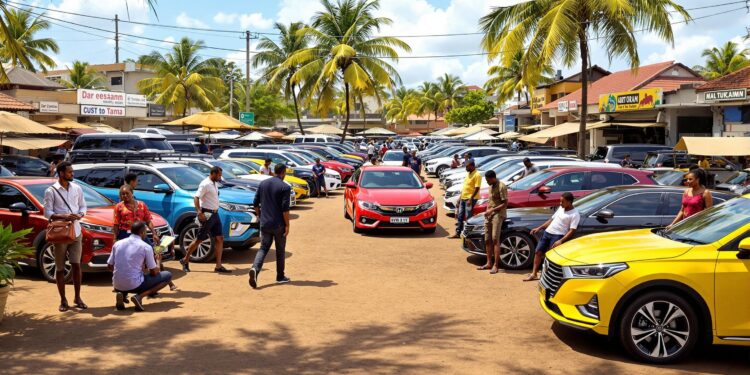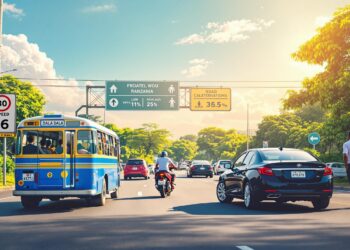Car prices in Dar es Salaam vary widely based on whether you’re buying new, used, or importing directly. Here’s a quick rundown:
- New Cars: Premium options like the Toyota Land Cruiser 300 start at $115,000, while budget-friendly models like the Toyota Rumion are priced at $27,000.
- Used Cars: Most used vehicles cost between $100 and $4,300, with SUVs and diesel models being the most popular.
- Imported Cars: Importing can save money upfront but often doubles the original price due to taxes and fees. For example, cars with over 2000cc engines face a 65% tax rate.
Key Costs to Consider:
- High import duties (up to 65%)
- Shipping fees ($1,500–$5,000)
- Fuel prices (petrol: $1.30/liter, diesel: $1.20/liter)
SUVs dominate the market due to their durability on rough terrain, but operating costs and taxes can add up quickly. Always factor in maintenance, parts availability, and long-term costs before buying.
Prices of Cars in Dar es Salaam Tanzania 🇹🇿
1. Brand New Cars
Brand new cars dominate Dar es Salaam’s premium market, largely led by Japanese manufacturers. Toyota remains the top choice, offering vehicles suitable for both city and rural driving.
In the high-end SUV category, the Toyota Land Cruiser series takes the spotlight. The Land Cruiser 300 starts at about $115,000, while the Land Cruiser Prado begins at $79,000. For business buyers, the Toyota Coaster is available with a starting price of $110,800.
Here’s a breakdown of current Toyota model pricing in Dar es Salaam:
| Vehicle Category | Model | Starting Price |
|---|---|---|
| Luxury SUVs | Land Cruiser 300 | $115,000 |
| Mid-range SUVs | Land Cruiser Prado | $79,000 |
| Compact SUVs | RAV4 Hybrid | $54,700 |
| Urban SUVs | Urban Cruiser | $31,450 |
| Commercial Vans | Hiace | $61,300 |
| Pickup Trucks | Hilux | $39,900 |
Toyota also caters to budget-conscious city drivers. Options like the Rumion ($27,000) and the Corolla Cross Hybrid ($57,300) meet the growing demand for fuel-efficient vehicles.
However, high import duties, taxes, and dealership fees limit new car sales. Diplomatic personnel and expatriates can take advantage of duty-free options through authorized dealers like Car Junction Tanzania.
For off-road enthusiasts, models such as the Land Cruiser 76 ($71,200), 78 ($69,800), and 79 ($74,800) offer tough, reliable performance.
2. Local Used Cars
The used car market in Dar es Salaam offers a cost-effective alternative to new vehicles, catering to a variety of road conditions. By 2025, this market is expected to reach $41.45 million, with projections climbing to $59.92 million by 2030.
Diesel vehicles make up a large portion of sales at 82%, while petrol-powered cars account for the remaining 18%. SUVs are particularly popular, representing 36% of used vehicle sales.
The market has seen a boost in accessibility and transparency since SBI Motor Japan opened its Dar es Salaam office in March 2021. Their online platforms allow buyers to compare prices easily and access detailed vehicle information, improving trust in the purchasing process.
Several factors affect pricing in this market, including the vehicle’s age, mileage, condition, fuel type (diesel models typically cost more), brand reputation, and the availability of spare parts. With only 2,000 to 3,000 new cars sold annually, the demand for reliable used vehicles remains strong.
Interest in used electric vehicles is also growing, driven by government policies and the high cost of new EVs.
sbb-itb-d9186c2
3. Direct Imports
Importing cars directly to Dar es Salaam can save money upfront but comes with additional costs that significantly affect the final price.
Import Duties and Taxes
In Tanzania, taxes are based on engine size:
| Engine Capacity | Combined Duties & Taxes |
|---|---|
| Under 1000cc | 45% (no excise duty) |
| 1000cc–2000cc | 50% (5% excise duty) |
| Over 2000cc | 65% (10% excise duty) |
These rates include a 25% import duty and 20% VAT on the car’s dutiable value. Cars older than eight years incur extra excise taxes, making newer models a more cost-effective choice. Beyond these taxes, shipping costs also play a major role in the overall expense.
Shipping Costs and Timeline
Shipping costs from the U.S. range between $1,500 and $5,000, with delivery times of 25–35 days. Buyers can choose between two main shipping methods:
- RoRo (Roll-on Roll-off): A cheaper option but offers less protection for the vehicle.
- Container Shipping: More expensive but ensures better security for the car.
Total Import Expenses
The overall cost of importing a car can nearly double its original price. Kennedy Mmari, Founder and CEO of Serengeti Bytes, highlights:
"While importing used cars is accessible in the short term, its long-term environmental, health, and safety implications are significant."
Additional expenses include port handling fees, storage charges, registration costs, inspection certificates (from JEVIC or QISJ), and import permit fees. Combined, these fees and taxes can add up to $40,000 to the car’s initial cost.
Market Outlook
The used car import market is growing steadily, with projections estimating it will reach $1.5 billion by 2032. However, stricter environmental policies could impact future imports, especially for older cars.
To successfully import a vehicle, buyers need to gather several key documents:
- Authorization letter
- Bill of Lading
- Proforma invoice
- Export certificate
- Import permit
- Vehicle inspection certificates
Cost-Benefit Analysis
Understanding the total cost of ownership is essential in Dar es Salaam, where the used car market is expected to hit $41.45 million by 2025. This growth highlights the strong demand for pre-owned vehicles and sets the stage for a closer look at operating costs, vehicle performance, and long-term ownership value.
Operating Costs
Fuel prices play a major role in vehicle ownership costs. In August 2023, petrol was priced at $1.30 per liter (up from $1.11), while diesel reached $1.20 per liter (up from $1.04). Higher fuel prices can significantly impact the operating costs of less fuel-efficient vehicles.
SUVs and pickup trucks dominate Tanzania’s market due to their ability to handle rough terrain. While these vehicles often come with higher purchase prices and fuel consumption, their reliability in rural areas often makes them a worthwhile choice.
Long-term Value Considerations
Beyond daily expenses, long-term factors are key to understanding a vehicle’s overall value. These include:
- Depreciation: New vehicles lose value faster than used ones.
- Maintenance: Older vehicles typically require more frequent repairs.
- Parts availability: Common models make finding replacement parts easier.
- Fuel efficiency: Newer vehicles are often designed to use less fuel.
- Insurance costs: These vary based on the vehicle’s age and type.
The rise of online car-buying platforms has made it easier for buyers to compare prices and choose vehicles that meet their needs and budget.
Buying Tips and Summary
Here are some practical tips to help you make a smart car purchase in Dar es Salaam, building on the cost insights shared earlier.
Pre-Purchase Checks to Keep in Mind
Before finalizing your purchase, make sure to:
-
Get a Mechanical Inspection
Have a trusted mechanic inspect the vehicle, especially if it’s used. Repair costs can vary widely depending on the brand. For example, Nissan parts tend to cost more than Toyota parts in Tanzania. -
Verify the Documentation
Double-check that all necessary paperwork is complete and legitimate. This includes:- Vehicle registration
- Insurance documents
- Import paperwork (if the car is imported)
- Service history records
Choosing the Right Vehicle
Your car should match your driving needs. Here’s a quick guide to help you decide:
| Vehicle Type | Best For | Things to Consider |
|---|---|---|
| City Cars (e.g., Toyota Passo) | Urban driving | Lower maintenance costs; less protection in collisions |
| SUVs | Mixed terrain | Durable but may have higher fuel consumption |
| Luxury Vehicles (e.g., Land Rover) | Premium segment | May need specialized maintenance outside Dar es Salaam |
Tips for Managing Costs
Owning a car comes with ongoing expenses. Here’s how to keep them under control:
-
Fuel Efficiency
Choose vehicles that are fuel-efficient to save on gas costs. -
Maintenance
Build a relationship with reliable service providers. Make sure spare parts are readily available and that local mechanics can handle your car’s needs. -
Insurance
Work with reputable insurance companies. Keep in mind that premiums often depend on the car’s value and type.
Related posts
- 7 Best Used Cars Under 10M TSh in Tanzania
- New vs. Used Cars: What First-Time Buyers Should Know
- Best used cars in Tanzania 2025
- Most sold cars in Tanzania




